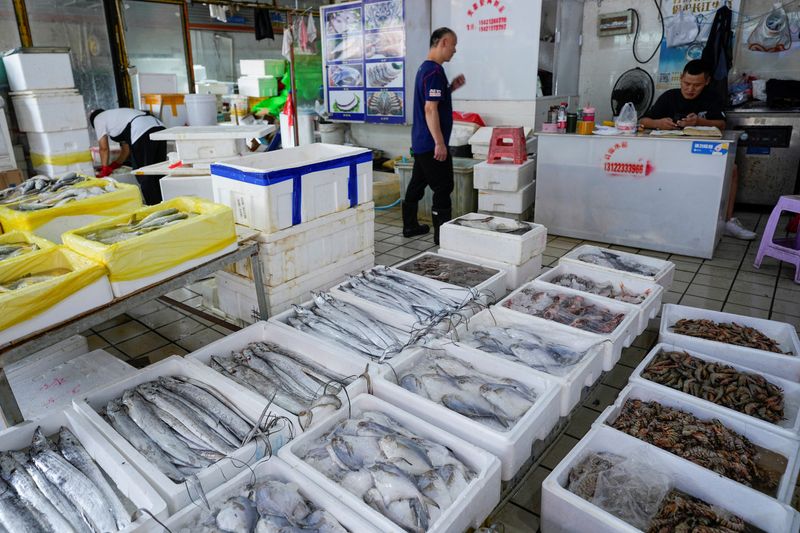U.S. ambassador to Japan visits Fukushima, expects U.S. support in seafood dispute
2023.08.31 06:35

© Reuters. Fish and shrimp are seen at a seafood market in Shanghai, China August 25, 2023. REUTERS/Aly Song
By Chris Gallagher and Sakura Murakami
SOMA (Reuters) -The U.S. ambassador to Japan, Rahm Emanuel, visited the Fukushima region on Thursday and told reporters he expected the U.S. to support Japan should China’s ban on Japanese seafood develop into a dispute at the World Trade Organisation (WTO).
Japan started releasing treated radioactive water from the wrecked Fukushima nuclear power plant into the Pacific Ocean last Thursday, prompting China, Japan’s biggest trade partner, to impose a ban on Japanese aquatic products.
Japanese officials have signalled the possibility of diplomatic action to urge China to lift its ban, which Japan says is not based on scientific evidence, including filing a World Trade Organization (WTO) complaint.
“If Japan decides to take that effort, the United States will stand by (it) not just because they’re an ally, but because there’s legitimacy to the case,” he said, although he added he could not prejudge what might happen and such support would ultimately be up to relevant U.S. government agencies.
Japan exported about $600 million worth of aquatic products to China in 2022, making it the biggest market for Japanese seafood exports, followed by Hong Kong, which announced its own ban on seafood imports from 10 Japanese regions after the release of the Fukushima water.
Japan has sought an immediate end to China’s ban and also complained of being inundated with harassment telephone calls since dumping the water.
“The economic coercion against Japan, the robocalls of harassment and disinformation both here in Japan and around comes right out of China’s playbook. This is all politics,” Emanuel said.
Prime Minister Fumio Kishida visited Tokyo’s biggest fish market on Thursday and said his cabinet would draw up measures to help the fishing industry by early next week.
The government will use tens of billions of yen (hundreds of millions of dollars), from budget reserves for this fiscal year to fund the measures, the newspaper reported.
Kishida told reporters following his visit to Toyosu fish market that requests from the industry had included support for companies to develop new markets and for discussions with China.
The government has set up two funds worth 80 billion yen ($548 million) to help develop new markets and keep excess fish frozen until they can be sold when demand recovers, among other measures.
In the city of Soma, near the wrecked nuclear plant, Emanuel had lunch with the mayor, Hidekiyo Tachiya, eating locally caught seafood. He also bought seafood at a supermarket and sampled Fukushima peaches while mingling with shoppers.
($1 = 146.0200 yen)








